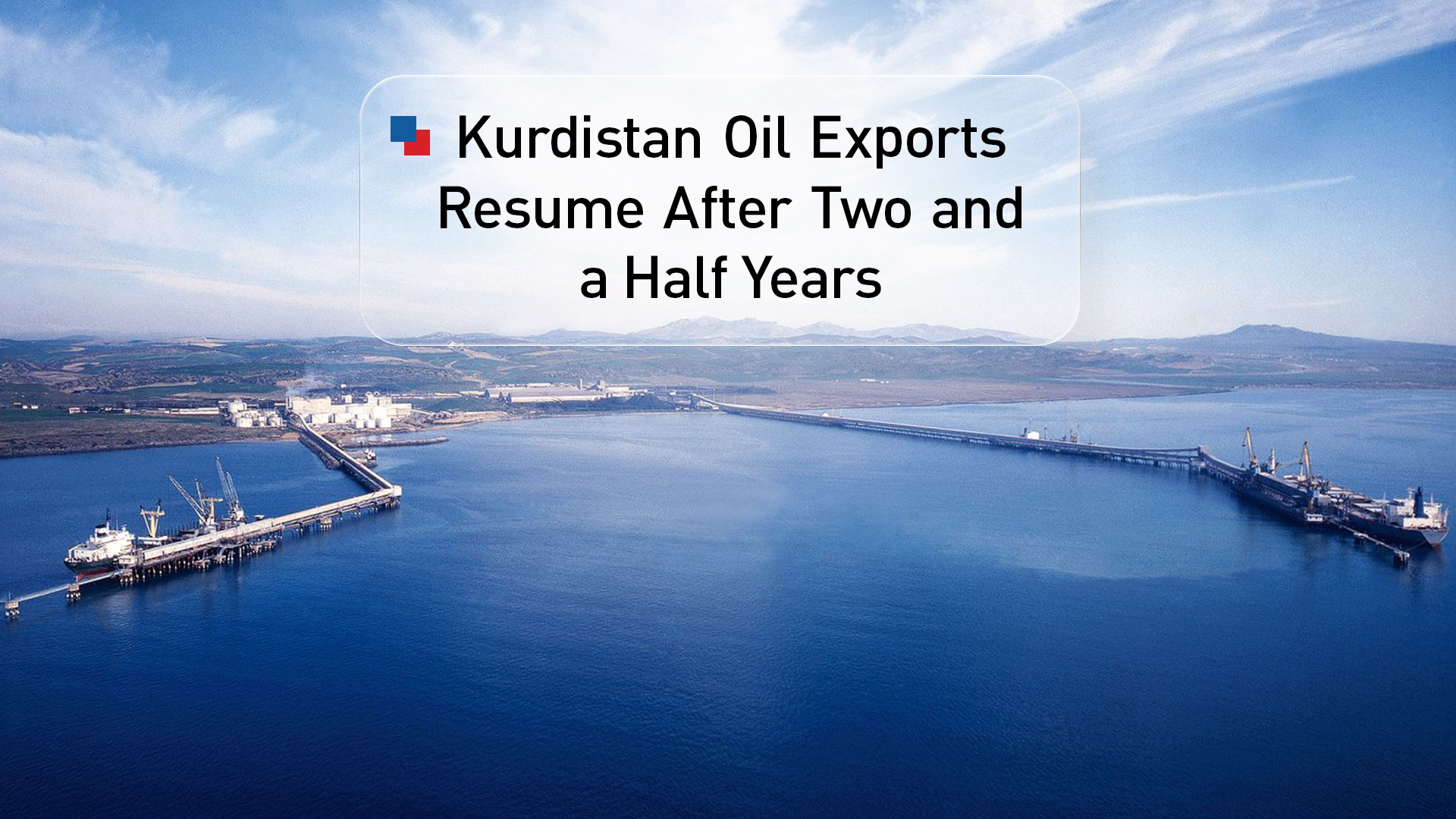Kurdistan Oil Exports Resume After Two and a Half Years, Marking Historic Breakthrough
Kurdistan's oil exports officially resumed Saturday at 6:50 a.m. through Turkey's Ceyhan port, ending a 2.5-year halt with 190,000 barrels per day now flowing to global markets under a three-month framework agreed by the KRG, Baghdad, and international companies.

ERBIL (Kurdistan24) – After more than two and a half years of suspension, the Kurdistan Region’s crude oil exports officially resumed at 6:50 a.m. on Saturday, with shipments from the Peshkabour oil station flowing once again to Türkiye’s Ceyhan port. Under the agreement, 190,000 barrels of Kurdish crude will be exported daily, while 50,000 barrels will be reserved for domestic consumption within the Region.
The resumption follows intensive negotiations between delegations from the Kurdistan Regional Government’s Ministry of Natural Resources, the Iraqi Federal Ministry of Oil, and international oil companies. The parties finalized a trilateral framework under which all Kurdistan’s crude will be handed to Iraq’s state oil marketer SOMO, which will oversee sales on global markets.
This arrangement formally reopened the locked valves of Peshkabour, reconnecting the Kurdistan Region’s energy lifeline to the Mediterranean. Exports are being monitored jointly by representatives of the KRG’s Ministry of Natural Resources and the Iraqi Federal Oil Ministry. Preparations at the Khurmala oil field near Erbil had already been completed, with crude from all eight fields in Kurdistan funneled there before being transferred to Peshkabour and onward to Ceyhan.
According to Kurdistan24’s correspondent Hoshmand Sadiq, SOMO has contracted with a major Swiss oil trading company to market the crude. Once at Ceyhan, part of the Kurdish oil will be shipped to European markets, while other volumes will head to North America and additional destinations.
The current agreement is valid for three months, during which Kurdistan’s fields are expected to produce 240,000 barrels per day, with 190,000 exported and 50,000 allocated for internal use. However, officials confirmed that for Iraq’s 2026 federal budget, export volumes will be recalibrated according to the Kurdistan Region’s production capacity.
The export route from Khurmala to Ceyhan spans nearly 600 kilometers, with crude taking significant time to reach the Mediterranean port. Under the terms of the deal, responsibility for transport up to Peshkabour lies with the KRG, while Turkey oversees the segment from Peshkabour to Ceyhan. At the port, the oil is transferred to SOMO, which assumes responsibility for global marketing.
The Iraqi Federal Ministry of Oil confirmed in a statement on Saturday that exports of crude from the Kurdistan Region through the Iraq–Türkiye pipeline officially resumed at 6:00 a.m. without any technical issues. The Ministry emphasized that the restart was achieved under the direct supervision of Deputy Prime Minister for Energy and Oil Minister Hayyan Abdul Ghani, in coordination with the Kurdistan Regional Government’s Ministry of Natural Resources. It described the moment as a clear success, the fruit of joint efforts between Baghdad and Erbil, and a “notable step toward managing national resources in a spirit of partnership and coordination.” The statement further underlined that the agreement contributes to ensuring continuity of exports and strengthening Iraq’s national economy.
Kurdistan Region Prime Minister Masrour Barzani hailed the breakthrough on social media, writing: “Today’s agreement between the Kurdistan Region and oil companies with the Federal Ministry of Oil and SOMO is the result of tireless efforts and months of negotiation by teams on all sides. With this step, oil from Kurdistan Region’s fields will again enter the global market.”
Iraqi Prime Minister Mohammed Shia’ al-Sudani also celebrated the development, describing it as a In a statement posted Thursday, he emphasized that the deal enables the federal government to receive crude from fields in the Kurdistan Region and export it through the Iraq–Türkiye pipeline. Sudani underscored that the resumption of exports would ensure fair distribution of resources and strengthen Iraq’s national revenues, calling the step a boost for investment.
Ali Nizar, Director General of SOMO, confirmed during a press conference on Friday, September 26, that the agreement was the culmination of 30 months of negotiations. He revealed that Kurdistan currently delivers about 240,000 barrels per day to SOMO, with 50,000 barrels retained for domestic consumption.
Nizar underlined the strategic importance of Kurdish crude for Europe, especially as a replacement for Russian oil. “Kurdistan’s oil will be exported to global markets via Ceyhan on the Mediterranean, a center of European trade. Europe needs Kurdish oil as an alternative to Russian supplies, while North and South America will also benefit,” he stated.
Under the interim framework, international oil companies operating in the Kurdistan Region will receive $16 per barrel, covering production and transportation costs. Payments will be processed through the U.S. Federal Reserve. Nizar stressed that this agreement is not temporary but represents a foundation for long-term understanding and cooperation between Baghdad, Erbil, and the companies.
The deal marks the first time since Mar. 25, 2023, when Iraq halted Kurdish exports through Ceyhan following a legal dispute with Türkiye, that the Region’s oil has re-entered international markets. For both Baghdad and Erbil, the reopening represents not only a financial relief but also a signal of renewed cooperation after years of political and economic strain.